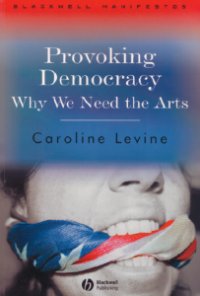
Recently, as the arts and politics have seemed ever more connected, it has become harder to make out where the relationship is healthy and where it is not. What Caroline Levine demonstrates in her timely ‘Provoking Democracy: Why We Need the Arts’ is how dependent we are upon a healthy balance.
This is an impressively researched and well-referenced book, incorporating case studies from Jacob Epstein’s ‘Rima’ to Richard Serra’s ‘Tilted Arc’ and the lyrics of 2 Live Crew. Using contemporary sources to great effect, Levine connects grand theories of political liberty to everyday arts experiences. The arts allow challenges to the conditioned uniformity that is the fatal flaw of democracy. They fill a gap that democracy cannot. The book is valuable for policy makers, cultural practitioners and a more general readership. However, in focusing on what she calls “the logic of the avant-garde”, Levine limits her scope to those making deliberate challenges rather than the role of cultural production in general.
For Levine, art is “democracy’s friendly enemy”, providing necessary dissent, but also vulnerable to conformity. The arts provide scope for an avant-garde to ask how things might be different or differently perceived. Thus, when the CIA promoted abstract expressionists like Jackson Pollock, they were both using him for their own political ends and accepting the risk of artists challenging values, ethics and aesthetics at home. Levine glosses over some interesting questions: although politicians did not compromise the integrity of individual artists used as intermediaries, they nevertheless magnified the prominence of those artists. If democracy needs the arts, is it only those arts that politics and the markets decide it needs? Can the arts be successful and free?
Levine examines the relationship between the arts and the polity by way of obscenity law, demonstrating surprisingly close parallels between the law and the avant-garde. Both protect minority voices and are defined by precedent. Levine’s moral for cultural practitioners is clearest in her analysis of Jeff Koons’ failed defence against accusations of plagiarism of a mass-produced image in his work ‘String of Puppies’. Koons argued for his absolute autonomy from society and the law as an artist, thus acting against the interests of the arts. By claiming greater value for his aesthetics than those of the original photographers, he took a profoundly undemocratic stance.
Provoking Democracy encourages constructive discussion of the relationship between the arts and democracy. The relationship between cultural provision, artists and the public merits further discussion. If the arts are valuable to democracy, then thought must be given to the education that provides the means by which to access and interpret them. If diversity is essential to democracy, but also vulnerable to the majority, then the capacity to accommodate such diversity without anxiety must be essential. Provoking Democracy should be invaluable in taking these challenges on.
Review by Samuel Jones, a researcher for Demos.
e: samuel.jones@demos.co.uk
w: http://www.demos.co.uk



